
Business in China: A look into Chinese trending terms
Understanding the intricacies of the China marketplace requires a deep dive into Chinese culture and trends. Emerging internet buzzwords are a trend that is worth watching. It allows us to comprehend the attitudes and behaviors of young Chinese generations as they move forward with their lives. At the same time, it allows businesses in China to gain an understanding of Chinese consumers and society.
China Internet Buzzword 7: 光想青年
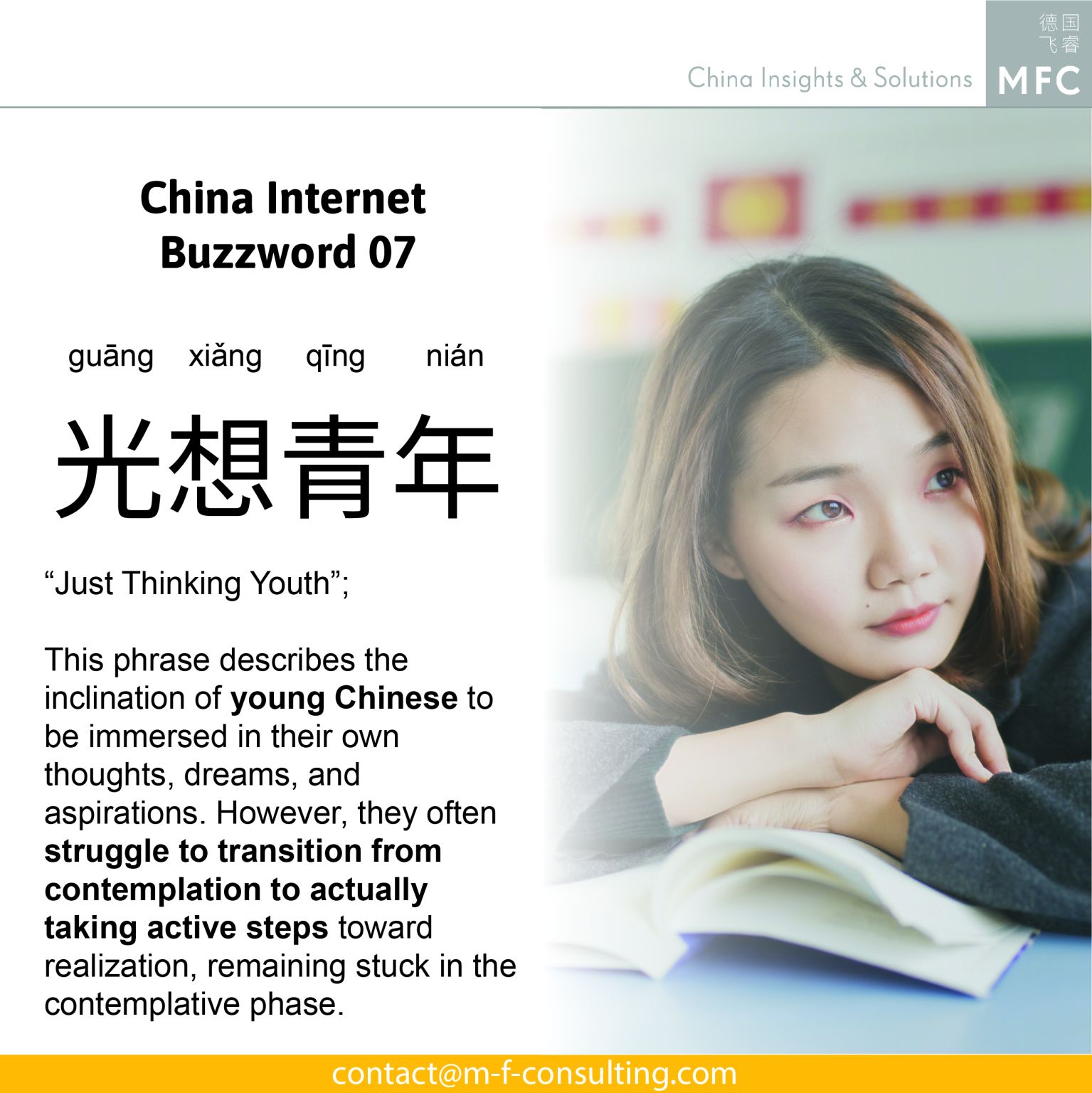
Young Chinese: Passivity or Acceptance of an Overwhelming Reality?
“光想青年” or “Just Thinking Youth” is a term that has been circulating on the Chinese internet for a while. It refers to the tendency of young Chinese to remain in a constant state of contemplation and dreams without taking active steps to put their thoughts into action. How is this trend interpreted?
- Passivity: Young Chinese people face a complex reality marked by strong societal pressure related to academic and job performance. While they encounter numerous possibilities that previous generations did not have access to, young people in China grapple with the country’s high unemployment rate among their demographic. It affects even those with high levels of education. This complex and paradoxical reality can be overwhelming. Many young individuals thus tend to escape into the world of their thoughts and dreams, as they struggle to take action to change their situation.
- Acceptance: This trend can also be seen as an acceptance of the high societal expectations placed on young people. In this interpretation, the term “Just Thinking Youth” is related to “tangping,” which means “lying flat” and doing the bare minimum. In the context of “Just Thinking Youth,” we observe that young people are accepting the overwhelming reality over which they have no control. They choose to lead their lives peacefully and are content with leaving high ambitions and dreams in the realm of their thoughts.
China Internet Buzzword 6: 35岁魔咒
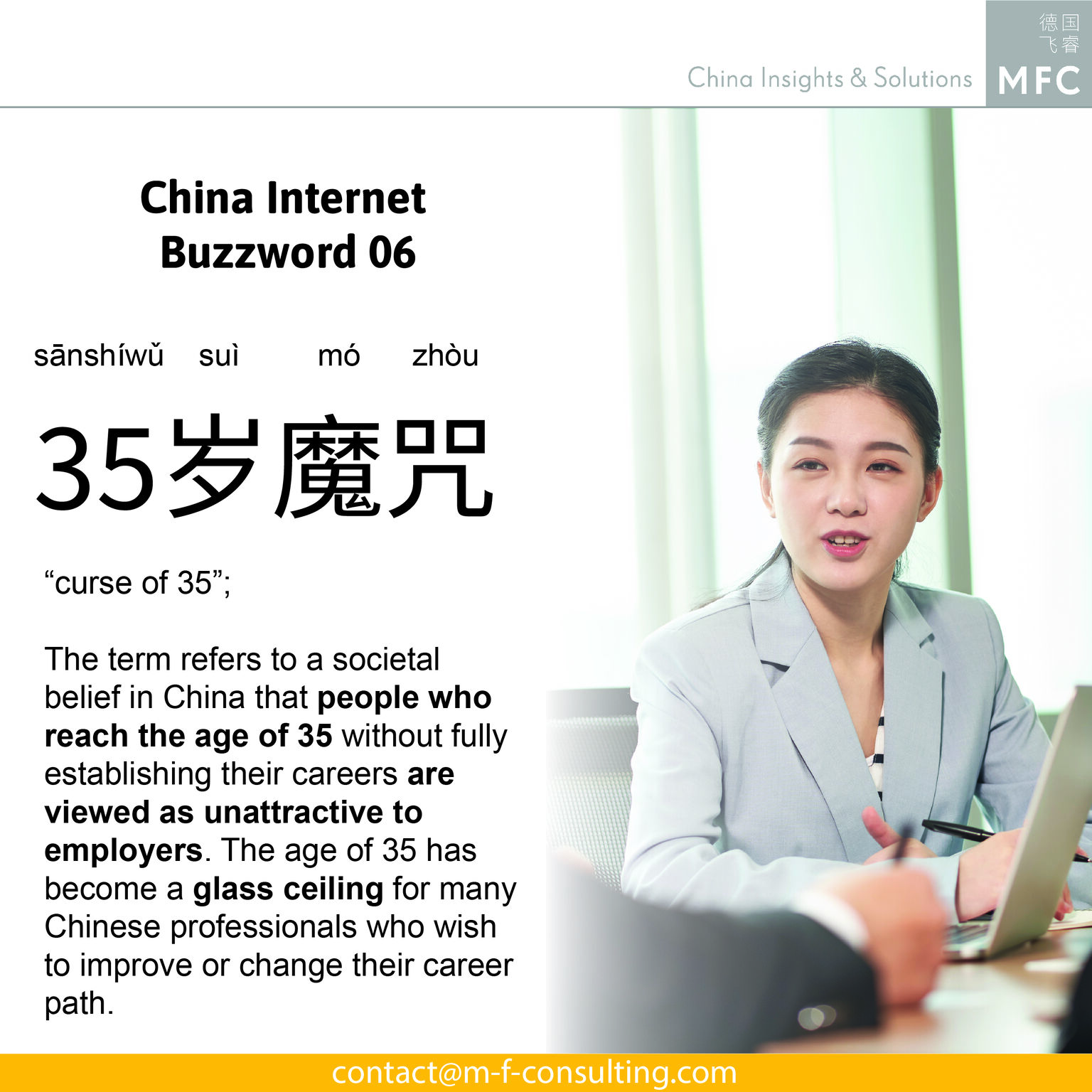
Does your life begin or end at 35? It depends on which part of the world you ask.
In many Western countries, at the age of 35, many people begin their first serious job, finish their education, or switch career paths. In China, 35-year-olds face a quite different reality. Post-pandemic China is now grappling with a complex employment crisis. One phenomenon stemming from that situation is the ‘curse of 35.’ The curse refers to the trend in which Chinese employers are unwilling to hire people older than 35. Many companies officially state in their job offerings that they will not consider candidates over 35 years old, and their requirements are legal under Chinese law. This situation holds true even for government positions. In this situation, young Chinese professionals who were laid off during the pandemic or wish to change a career path are left in a blind alley.
China: Why are 35-year-olds not attractive for Chinese companies?
- Industry: Many industries in China are at a labor-intensive stage that requires hiring physically fit and resilient employees.
- Efficiency: In many Chinese companies, employers value workers who are efficient at completing assigned tasks rather than investing in growth opportunities for current employees who may threaten the positions of existing managers.
- Hierarchy: Promotions often occur for employees below the age of 35, and after that, the company’s hierarchy is typically settled.
- Costs: To cut back on costs, companies tend to prioritize fresh graduates over experienced workers in their thirties who have higher salary expectations.
- Expectations: Workers in their thirties have a higher awareness of their working rights and are less willing to work overtime than people who have just entered the workforce.
The curse of 35 takes a huge toll on Chinese society. It contributes to the rising insecurity among young Chinese people which directly influences marriage rates and population growth. It is crucial to further observe how this situation will influence consumer markets and shape Chinese society in the upcoming decades.
China Internet Buzzword 5: 国潮
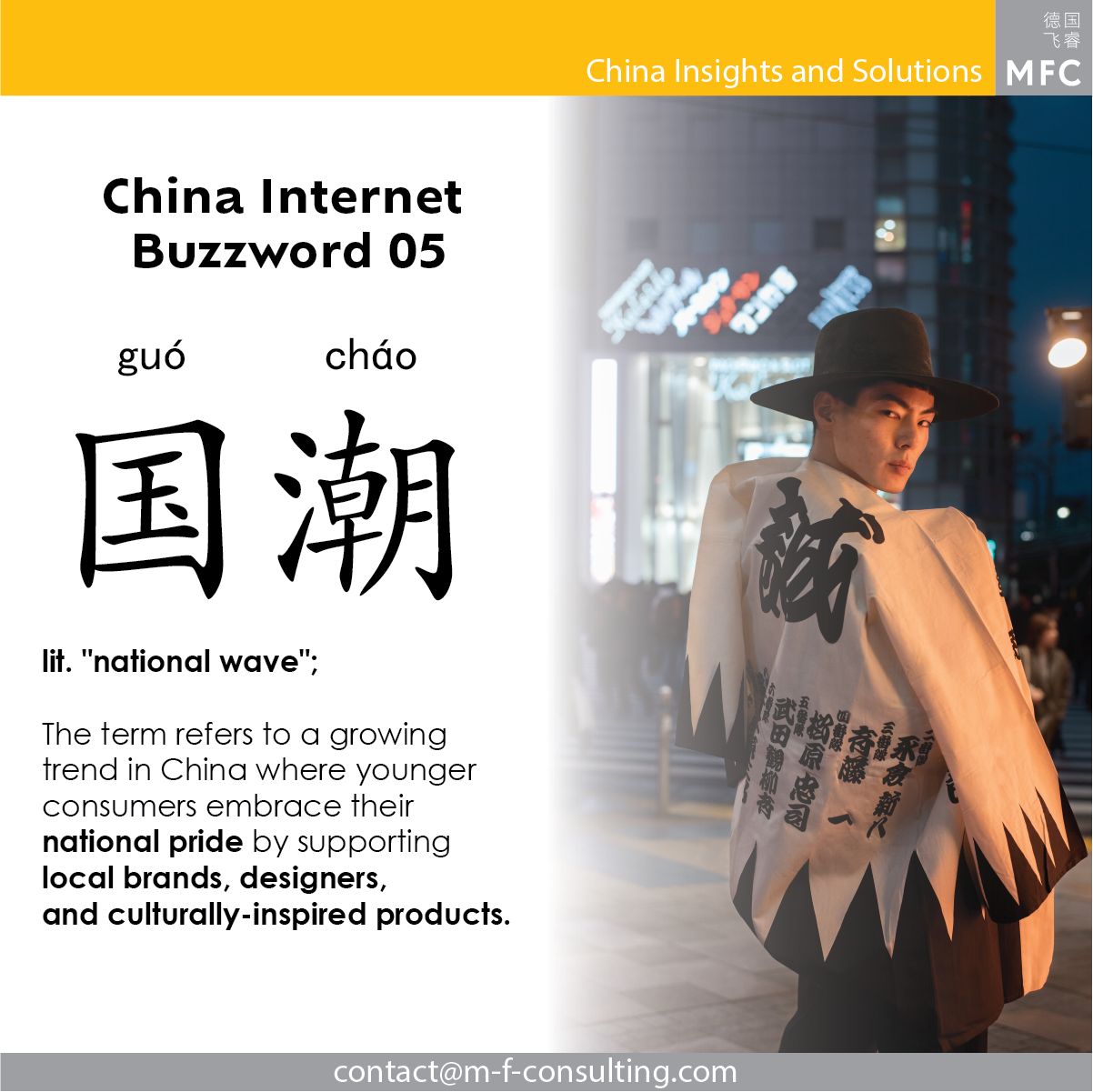
What is 国潮 (guó cháo)?
Guochao, also known as the “national wave,” is a growing trend among Chinese consumers that emphasizes support for local brands, designers, and cultural references in various products. It signifies a shift from the previous perception of “Made in China,” which has at times been associated with poor quality and imitation of Western products. Thanks to guochao the new focus is on products that are “Created” or “Designed in China.”
The younger generation of Chinese consumers recognizes the improved quality of Chinese brands and wishes to embrace their national pride by endorsing local brands and designs that draw inspiration from traditional Chinese culture.
How does guochao impact foreign brands in China?
The guochao trend has undoubtedly impacted foreign brands in the Chinese market. The perception that Western brands automatically equate to superior quality is no longer prevalent. Chinese brands now offer innovative, high-quality products that are tailored specifically to the Chinese market. Consumers believe that these goods are designed with their preferences and needs in mind. According to a report by the People’s Daily Research Institute and Baidu, from 2016 to 2021, domestic products received three times more attention than foreign goods. The three categories that saw the highest increase in consumer attention were cell phones, apparel, and cars. In 2020, 77% of online searches for smart cars were focused on Chinese companies. However, this does not imply that foreign brands are excluded from this trend, which requires a shift in focus when designing products for the Chinese market.
For instance, some luxury fashion brands have chosen to collaborate with Chinese artists and designers in their clothing lines. By incorporating well-thought designs that reference Chinese culture, these brands have successfully appealed to Chinese consumers. However, guochao is not limited to the fashion industry alone; it highlights the importance of deeply understanding Chinese culture and society when introducing a product to the Chinese market. Tailoring products, marketing strategies, and brand communication to align with the Chinese social environment has become more mission-critical than ever before.
Image by: freepik.com
China Internet Buzzword 4: 烟火气
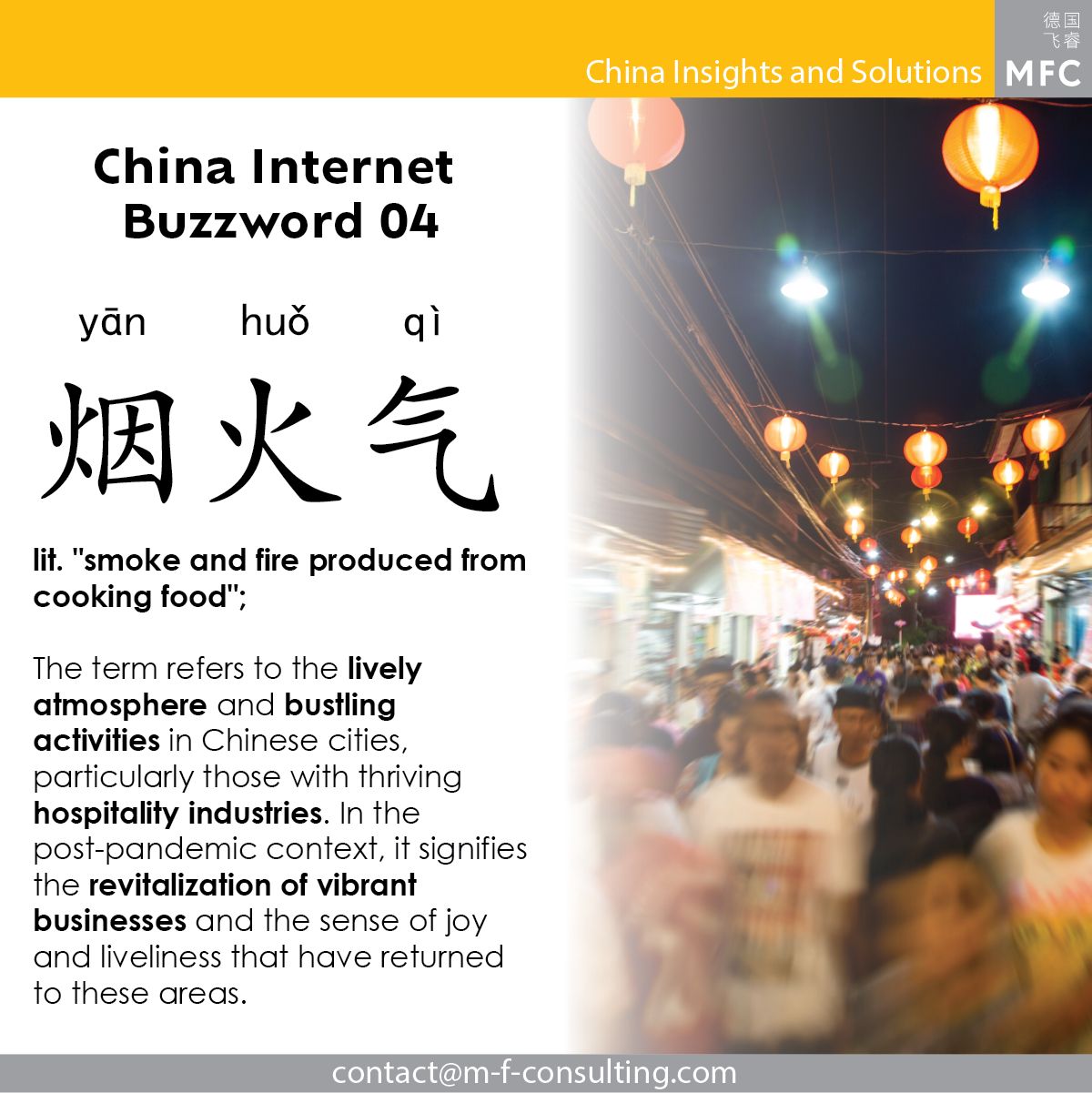
“烟火气” (yān huǒ qì) literally translates to “the smoke and fire from cooking food,” but it is commonly used to describe the lively and bustling atmosphere of daily life, particularly in Chinese cities with vibrant hospitality industries. The association with food and cooking holds great significance in Chinese culture as it symbolizes a sense of belonging and community.
The term gained popularity in the context of the post-pandemic recovery, highlighting the restoration of vitality to areas that were affected by COVID-19. It signifies the return of bustling activities, vibrant businesses, and the general sense of joy and liveliness as communities bounce back from the impact of the pandemic.
China Internet Buzzword 3: 电商直播

电商直播 (diàn shāng zhí bò), e-commerce livestreaming, is a popular form of online shopping in China. Customers can view and buy products through a live video broadcast hosted by influencers or salespeople. They showcase the products in real-time and interact with viewers. Shoppers can make purchases directly during the livestream with special discounts or limited-time offers.
E-commerce livestreaming is a crucial marketing tool in China. For many foreign companies, collaborating with influencers is key to boosting their visibility and sales in the Chinese market. Combined with Chinese social commerce platforms like Xiaohongshu, Douyin (TikTok) or Kuaishou, e-commerce livestreaming has become a useful tool for Chinese and foreign brands to sell their products.
China Internet Buzzword 2: 躺平
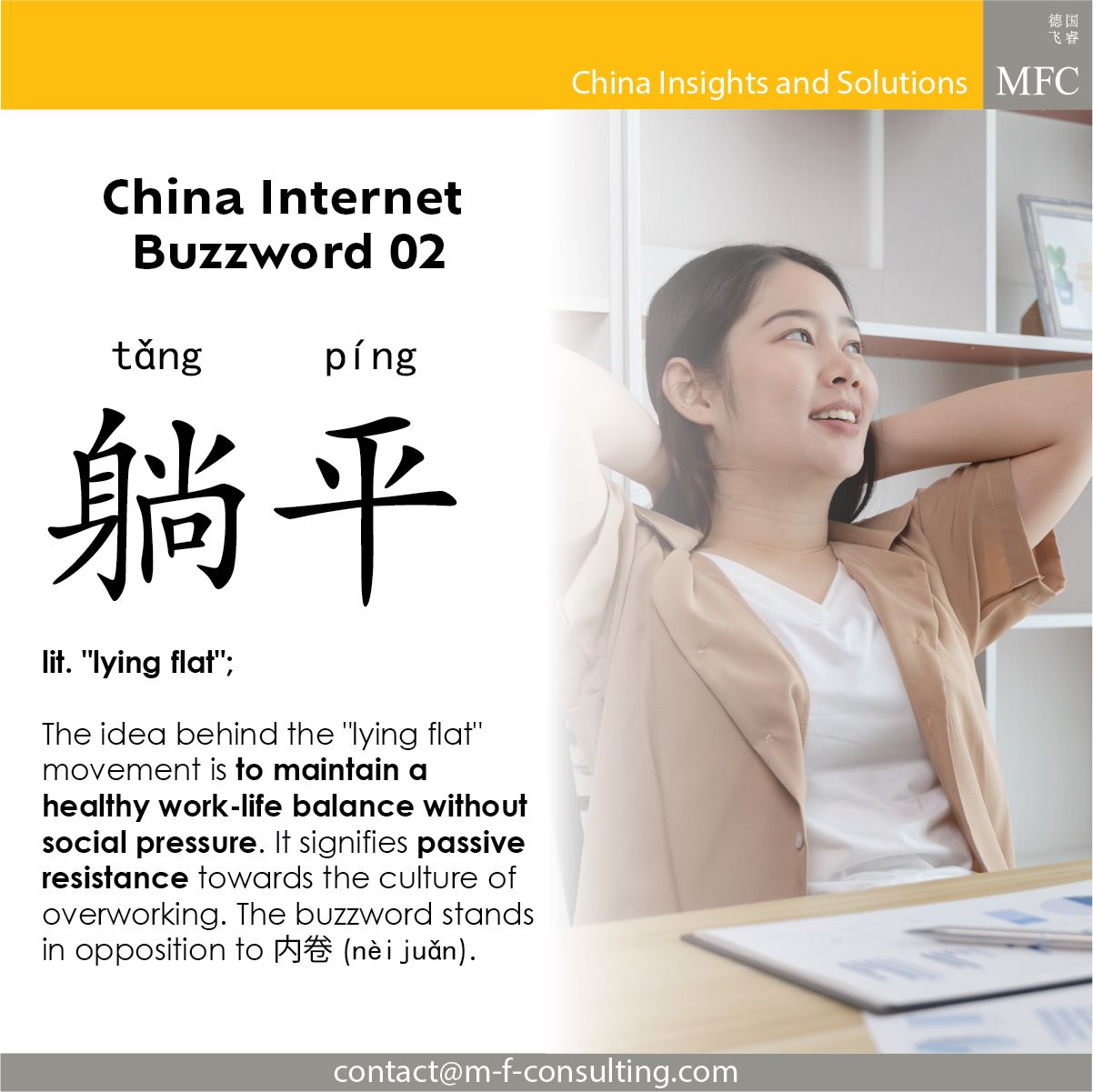
Chinese business culture and the workplace environment are dynamically evolving. We would like to introduce 躺平 tǎng píng or the “lying flat” movement. More and more Chinese employees are breaking away from the societal pressure to overwork. Instead, they choose to prioritize their mental health. The overachiever attitude is being replaced with a more balanced and laid-back approach to one’s career.
China Internet Buzzword 1: 内卷

The concept of “neijuan” (内卷) has gained increased attention in recent years in China. It has been associated with the rise of hyper-competitive educational and employment systems.
In this context, individuals may feel compelled to work longer hours, take on more responsibilities, and engage in hyper-competitive behavior in order to succeed. ften at the cost of their mental health, physical well being, and personal relationships.
Follow us on LinkedIn for more Insights: MFC – China Insights & Solutions
